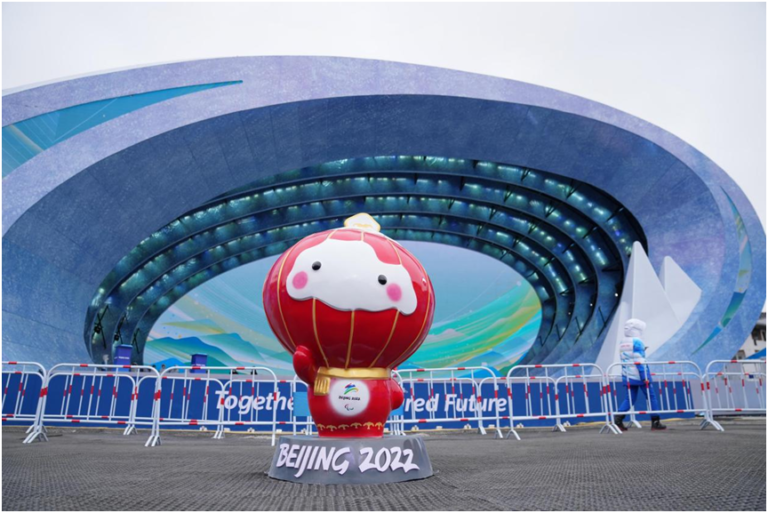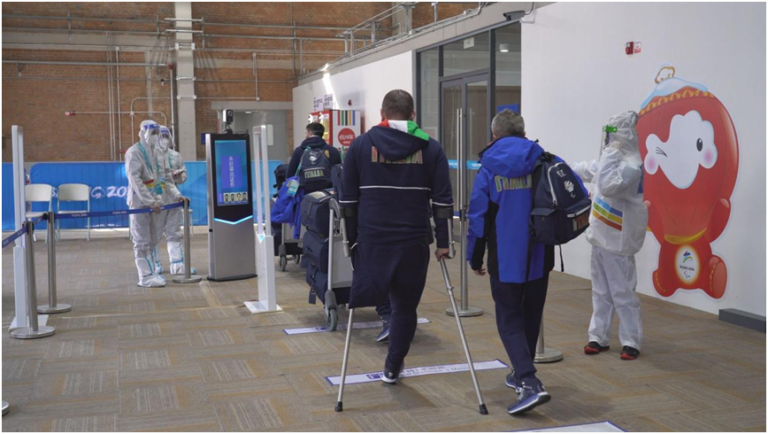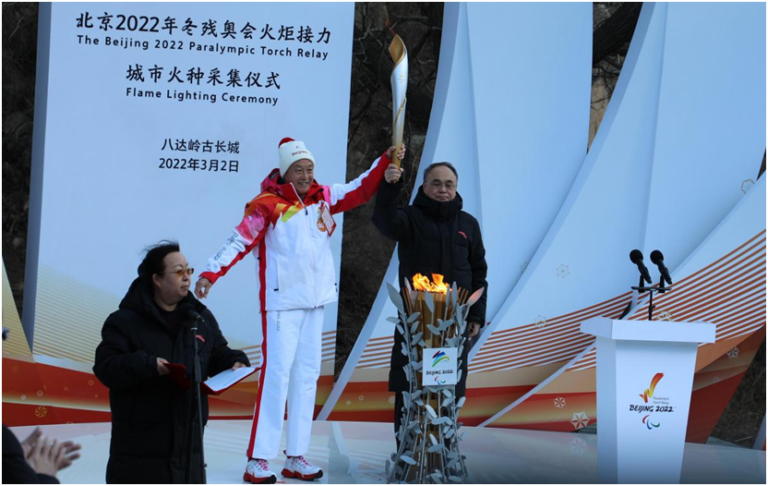
By Liu Shuoyang, Wang Liang, People’s Daily
Committed to organizing the green, inclusive, open and clean Games, China has planned and prepared for the Winter Paralympics and Olympics at the same pace during the past more than six years to make sure the Paralympics will be as splendid as the recently-concluded Olympics.
Recently, barrier-free facilities in the competition venues and the Beijing 2022 Winter Paralympic Villageshave been widely acclaimed for considerate designs and arrangements.
The preparations for the 2022 Winter Paralympics are efficient and smooth, said Andrew Parsons, president of the International Paralympic Committee (IPC), adding that thebarrier-free facilities have been in place at the venues and Paralympic Villages, providing a safe and convenient environment for participants.
A three-storey two-way accessible ramp, with wide-angle mirrors placed in the turns, has been set up at the National Aquatics Center, a venue for wheelchair curling during the Paralympic Winter Games.
The wide-angle mirrors enable athletes with disabilities to spot players coming from the opposite direction as early as possible, thus avoiding collisions, said a staff member at the venue, who added that there are several half-space landings on the ramp for the convenience of disabled athletes.

Such arrangements demonstrate Games organizers’ humanistic concern for athletes with disabilities.
“All the accessible designs are aimed at providing a fair and comfortable competition environment for athletes with disabilities,” noted Liu Zhenduo, facility manager of the venue operation team.
Under the principle of frugality in hosting Winter Games, all five competition venues for the Paralympics have been transformed from the ones used in the Winter Olympics. These competition venues have been certified as qualified for competitions by international Olympic winter sports federations.
The preparations and venue transformation for the Paralympics have been efficient and smooth, which is attributed to Games organizers’ careful consideration of the needs of both the Olympics and Paralympics during the preparations.
During the design and construction of the venues, they fully explored the possibility of creating a barrier-free environment, which greatly reduced workload and improved work efficiency in thetransformation of venues.
To make it easier for athletes with disabilities to check in, the Paralympic Village in the Yanqing competition zone set up security checkpoint at the entrance of the Village. Thanks to the thoughtful arrangement, athletes with disabilities only need to get off the vehicle once during the trip from the airport to their accommodation. While the security checkpoint is brought closer to the Paralympic Village, athletes with disabilities also feel more connected with the service teams.
Compared with that during the Olympics, the checkpoints at Paralympic Villages not only have an extra green channel for manual security checks, but provide more careful and thoughtful security check procedures.
“We received a warm and consideration welcome here and are really thrilled,” said the deputy head of the Slovakian delegation to the 2022 Winter Paralympics.

While ensuring athletes with disabilities live comfortably, China has also made efforts to bring them safe and good competition experience.
Many athletes have already carried out training in some venues of the Paralympics, and highly praised their operation.
The National Biathlon Center, one of the Paralympic venues, prepared Braille reading materials and maps, ensuring information accessibility to visually impaired people and helping them better understand the information about venue and competition.
As the temperature has risen recently,the technical team of the National Alpine Skiing Center, another venue, has managed to reduce the surface temperature to maintain the hardness of the snow.
In order to keep the ski run level and clean, the team members clean it carefully every day.“These are all for the best possible competition and training environment for athletes,” said Li Guangquan, a technical official.

“We will integrate the construction of accessible facilities for the Beijing 2022 Winter Olympic and Paralympic Games into the efforts to improve the accessibility of the environment in the host city, so as to leave rich sustainable heritage to the city,” said Yang Jinkui, head of the Paralympics department of the Beijing Organising Committee for the 2022 Olympic and Paralympic Winter Games.
Since 2019, Beijing has carried out a special campaign for improving environmental accessibility between 2019 and 2021, under which it handled more than 210,000 cases of illegally occupied and idle accessible facilities and established 100 high-quality demonstration zones of accessible environment and 100 “15-minute radius convenient and barrier-free life circles”.
Zhangjiakou city, the co-host city for Beijing 2022, newly built and transformed more than 350 kilometers of sidewalk tactile paving for the visually-impaired and 4,422 curb ramps between 2018 and July 2021, creating a more convenient environment for people with disabilities to move around.










